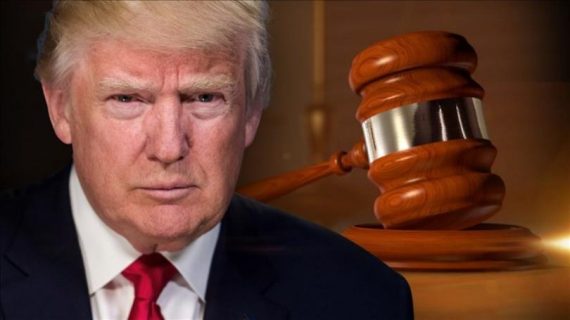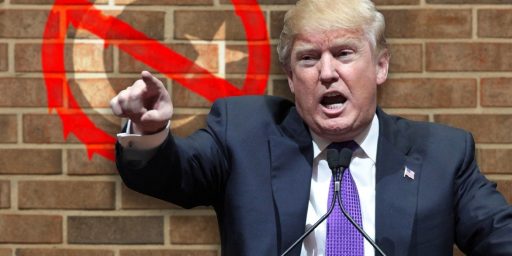Trump And The Federal Courts
Federal Courts continue to rule against the Administration, and the President continues to lash out at Judges and demonstrate his contempt for the Rule Of Law.
As I noted yesterday, a Federal District Court in Washington has blocked the implementation of the Trump Administration’s ban on military service by transgender Americans, a ruling that many are hailing as a significant victory for the rights of transgender Americans. Leaving aside the substance or subject matter of the ruling, though, this ruling is just the latest example of Federal Courts blocking efforts by the Trump Administration to either implement the Administration’s policies via Executive Order or to reverse the policy decisions implemented by the Obama Administration at the stroke of a pen. This ruling, though, is just the latest example of Federal Courts blocking efforts of the Trump Administration to either implement the President’s policies. The most notable examples of this, of course, have come in connection with the Muslim Travel Ban, which has been the subject of multiple court orders. It started with the temporary ban issued in late January which was blocked by a Federal District Court Judge and the Ninth Circuit Court of Appeals had issued injunctions against the order. After those orders, the Administration issued a revised ban that purported to address the problems pointed out in the initial order. That order purported to make certain changes to the bill but was itself struck down both by Federal Judges across the nation and by the Fourth and Ninth Circuit Courts of Appeal. In June, the Supreme Court issued a ruling regarding the Trump Administration’s Executive Order that banned travel from six predominantly Muslim nations that upheld the ban in some respects but also ruled that it could not be applied to all immigrants from these nations. Specifically, the Court ruled that exceptions must be made for people with valid visas, and those with bona fide family or business connections to the United States, although it didn’t specify what it meant by that. Subsequently, the Administration issued a new indefinite ban that applied to several new countries, but that ban has also been blocked by two Federal District Court Judges. Additionally, two Federal Court Judges, one in California and the other in Illinois have issued orders blocking the Trump Administration’s actions to attempt to punish so-called ‘sanctuary cities’ that refuse to cooperate with Federal immigration authorities with regard to undocumented immigrants.
Each of these adverse rulings have, predictably, led to a backlash from Trump and his supporters as well as other conservatives. In a post earlier this month in National Review, for example, law professor Josh Blackman argued that the rash of court defeats that the Trump Administration has suffered in Federal Courts from Hawaii to New York City can be attributed largely to Judges who are opposed to him politically forming what he referred to as a “legal resistance” movement whose rulings are based more on politics than the law. David B. Rivkin Jr. and Lee A. Casey made a similar argument in The Wall Street Journal back in May in response to the Fourth Circuit’s ruling on Trump’s Muslim Travel Ban. Reacting to that same ruling, Ilya Shapiro argued that “what’s going on here isn’t a sober legal analysis” but “a wholesale rejection of Donald Trump.” To be fair, all of these people are legal academics and writers who base their criticisms as much in the law as they do in politics, and most of them have been as critical of Donald Trump and the Trump Administration as they are of the rulings in many of these cases. Additionally, it’s certainly the case that there can be good-faith reasons for disagreeing with the decision of a particular Judge or Court even if one happens to agree with the outcome. Ascribing those outcomes to political motivations to political considerations rather than a disagreement over the law between people who are equally as well-educated, however, strikes me as being without merit unless one can truly say that there is no legitimate legal basis for a decision in a particular case. Such arguments seem to me to accomplish little other than contributing to the effort to undermine respect for the Rule of Law that has been a clear part of President Trump’s own reaction to these same decisions.
Additionally, as Dahlia Lithwick and Stephen Vladeck argue in an Op-Ed in The New York Times, this effort to cast decisions against the Administration as stemming from political bias rather than a defensible interpretation of existing law poses particular dangers:
This is dangerous new ground, to cast judges who rule against a president as biased or unprincipled frauds. Unlike the current legal battle over the travel ban, there was no broad effort by Obama supporters to discredit every single judge who ruled against that administration — as opposed to criticizing the reasoning of their decisions on substantive grounds.
discrediting federal jurists as having joined “the resistance” isn’t merely an argument lacking in analysis or evidentiary support; it’s also profoundly dangerous, for it suggests that any and all rulings against President Trump are not just doctrinally incorrect but also illegitimate. Much like criticism of all unflattering media reports as “fake news,” and attacks on the loyalty or patriotism of legislators who don’t vote in support of the president’s agenda, denouncing and dismissing all judges with the temerity to rule against Mr. Trump represents a direct attack on the independence and integrity of the entire judicial branch.
Attacks on individual judges based on a single ruling or upon the geographic location of their court or the president who appointed them are broadsides against the entire judicial branch. These attacks undermine public confidence in the impartiality of judges and will make it harder in the future for the courts to stand up to the political branches, even in cases in which their current critics think they should.
Of course, the individual judges who are maligned by these critics could fight back — much like most of the other institutions, including entire media outlets, the former F.B.I. director James Comey and Senate Republicans like Bob Corker of Tennessee, who have been subjected to what Orin Kerr of George Washington University Law School has described as the “politics of delegitimization.” But, in an irony upon which their critics may be relying, the judiciary is the only institution in our system that cannot properly defend itself against such attacks, lest it be accused of engaging in the very political activism for which it is being unfairly criticized.
The other part of the argument that Lithwick and Vladeck don’t touch upon is, of course, that the criticisms that have been leveled against the Judges who have ruled against the Administration over the past nine months comes across as giving legitimacy to many of the attacks on those same Judges that one hears from Donald Trump and his supporters. After each of these legal setbacks, the President and the Administration have lashed out against the Judges, often on quite a personal level and the fact that these academics and scholars are appearing to be put a veneer of legitimacy on that backlash is where the real danger arises. Trump himself, of course, has a long history of lashing out against Court rulings that go against him or his personal or business interests. The most notable example of that, of course, came during his candidacy when he stated that the Judge presiding over the Trump University fraud cases was biased against him due to the fact that the Judge came from a Mexican-American heritage, implying that he based his legal rulings in the case were due to things such as Trump’s accusations that Mexican immigrants were primarily rapists and criminals and his promise to build a wall on the Mexican border. In reality, there was no evidence that Judge Curiel had demonstrated any bias against Trump personally or with respect to his business venture, and in fact, many of his substantive rulings in the case were in Trump’s favor. The manner in which he has lashed out against Judges since becoming President, then, is largely consistent with the way he has acted to adverse legal outcomes throughout his professional life.
There’s a difference, of course, between the things Donald Trump said as a businessman/celebrity or as a candidate for office and what he says as President of the United States. His attacks on the judiciary today are essentially nothing less than the Executive Branch attacking a co-equal branch of the Federal Government, and one that is uniquely unable to defend itself as Lithwick and Vladeck note in their Op-Ed. It would be considered a tremendous breach of Judicial ethics, for example, for a sitting Judge to denounce a sitting President or Congress in the manner that Trump and his diehard supporters have attacked the Judges who rule against him and the actions of his Administration. As I noted back when Trump was still just a candidate, I made note of his obvious contempt for the Rule of Law:
Based both on his rhetoric and his actions, Donald Trump gives the impression of being a President who sees himself as unconstrained by the law or the other branches of Government in the tradition of Jackson or Richard Nixon, both of whom set off Constitutional crises from which it took the nation years to recover. As in the case of those two previous Presidents, he would likely justify his actions by appealing to the same populist, anti-establishment rhetoric that has fueled his campaign from the start. The difference is that, this time, he would be President of the United States and his rhetoric would be tied to action that could do real damage to the Rule of Law and to the Constitution. Furthermore, unlike any of his predecessors, Trump seems to have command over a mob of supporters that would rush to his defense even when he was clearly wrong. This is why the arguments that equate Trump to the European far right, and even to fascists and authoritarians of the past, are completely on the mark. Either Donald Trump is lying to his supporters or he is the kind of man who cannot be trusted with political power even in a Constitutionally limited democratic republic. Under the circumstances, it would be foolish for anyone to believe that this is all a big con on Trump’s part, and much safer to assume that he quite simply cannot be trusted with political power.
Unfortunately, Trump is now President. That means his attacks on the Judiciary are more than just rhetoric. Rather than reinforcing those attacks, legal scholars would do well to criticize them and refrain from arguing that Judges who happen to disagree with them are acting out of political motives rather than legal disagreements.







Rule of Law is a chimera. Citing rule of law or abuse thereof only indicates the level of support or disdain that the speaker holds for the question at hand. There is no other meaning. At all. Ever. It’s all gotcha tactics. Stop supporting the fiction that our laws mean anything until we start electing legislators who will legislate again.
What were you expecting from National Review and WSJ?
Much of the commentary here revolves around predicting or bemoaning SCOTUS decisions based on party affiliation of the Justices. Unfortunately it seems to be valid. However, one would expect SCOTUS Justices have more discretion in these things than lower courts guided by SCOTUS decisions.
@Just ‘nutha ig’nint cracker:
If you really believe this, it’s worth asking why you haven’t (a) fled the country, or (b) moved to a big empty patch and stocked up on food/water/arms/etc. If the Rule of Law is truly dead, anarchy or tyranny are imminent.
I think you’re being hyperbolic. If anything, the fact the courts are able (and willing) to strike down unlawful directives from the Trump administration indicates that some of the checks and balances are still working, at least for now.
The question is: What will happen the when this administration (or a subsequent administration) makes a concerted effort to override a judicial decision by force? You’ll know rule of law is really dead if someone in the executive calls on the military or the police to take a judge into custody for issuing a decision they don’t like, and it happens.
From CNN today,
He said he might like to sent the NYC truck attacker to Guantanamo instead.
Meanwhile at Guantanamo a sixteen year old case has resulted in a judge, a USAF colonel, confining a defense attorney, a USMC general, for 21 days for contempt in a disagreement which the slapped together military tribunal system can’t deal with.
@CET: I will only note that what boneheads like Trump and the various other spewers of “rule of law” blather say, what citizens believe “rule of law” means, and that checks and balances still work are not related phenomena. And I do consider leaving the country, monthly, and for reasons other than that Donald Trump is President.
@gVOR08: Is that the case where the Lt. with no death penalty experience has been ordered by the judge to continue the trial and where, apparently, allegations of prosecutorial misconduct have been levied? My friend was telling me about it today.
(Edited to change “charges” to “allegations”)
@Just ‘nutha ig’nint cracker:
Yes. Best link I found quickly, not up to date.
http://www.miamiherald.com/news/nation-world/world/americas/guantanamo/article178691836.html
@Just ‘nutha ig’nint cracker:
If you consider ‘rule of law’ to be totally unrelated to the checks and balances built into government, then we have very different understandings of one or both of those concepts….
@CET: No, I don’t consider checks and balances to be unrelated to rule of law; I consider contemporary blather about rule of law to be unrelated to both checks and balances AND rule of law as those terms would have meaning if they had any in contemporary American political discourse. Most people talking about either one simply mean “I didn’t get what I want; therefore, the system is corrupt.” If you happen to be one of the, by my count, approximately dozen or so people in the nation who can intelligently carry on a conversation using the terms “rule of law” and “checks and balances” and have had your feelings hurt by what I said, accept my apologies, but otherwise, I’m not sure that I even care about your opinions of my understanding of the terms.
@gVOR08: Thanks! Interesting article and I expect that somewhere, someone will decide that if the Supremes take up the issue in question, it will be an “unacceptable intrusion upon the rule of law by a civilian court intruding on a military justice matter that civilian court has no business intruding upon.” But then again, I’m both an ig’nint cracker AND a cynic, so we can discount my expectations in this case.
@gVOR08: Also, I did like the prosecution’s assertion that if uncharged detainees [emphasis added] were inadvertently overheard that fact was of little consequence, glossing over the fact that the person in question is not exactly the same as an “uncharged detainee.”
The week’s op-ed piece:
http://fallacyreporter.com/2017/11/02/stupid-or-sleazy-or-both/